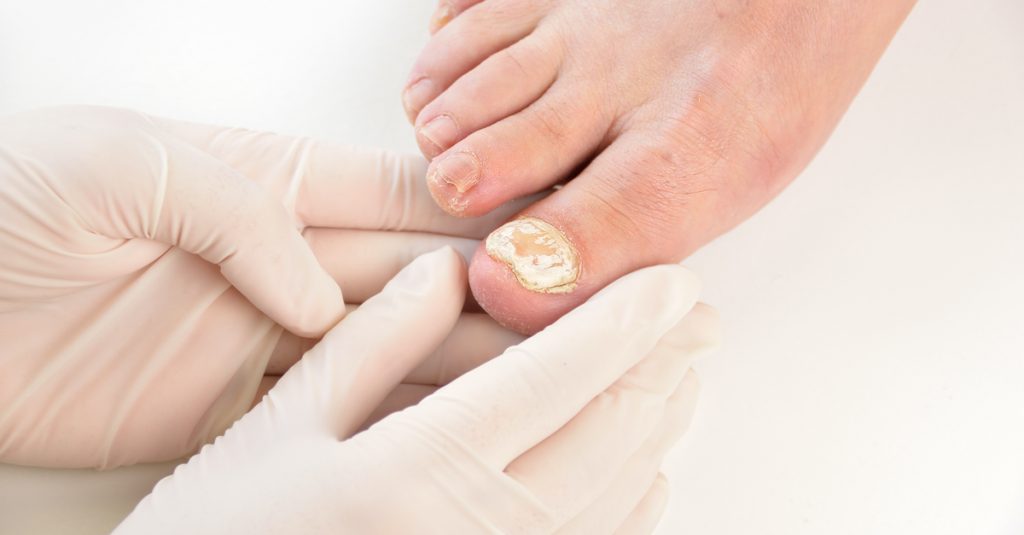What is a Fungal Nail Infection?
The medical term for fungal nail infection is Onychomycosis. It is a common complaint often seen by Samantha Hatton our podiatrist at Cheshire. It can be associated with athlete’s foot – Tinea Pedis.
The infection is usually caused by a yeast or mould infection which are types of fungi. It is rarely painful unless the infection progresses and becomes more severe.
How do I know I have a Fungal Nail Infection?
Fungal nail infections cause the nail to become thickened, develop a yellow or brown discolouration, and can start to crumble. They can also appear misshapen and can lift or loosen from the nail bed.
Many conditions can cause this appearance. To diagnose a fungal nail infection you can ask your doctor to arrange an analysis of your toenail clipping at the local hospital, or you can book an instant fungal nail test with one of our podiatrists here at Cheshire lasers.
Factors that increase the risk of Nail Infections:
- Nail damage
- Diabetes
- Psoriasis
- Poor Hygiene
- Weak immune system
- Smoking
- Sporting activities causing trauma to the nail i.e. running, kicking, damp shoes
How do I treat a Fungal Nail Infection?
- antifungal nail cream – it can take up to 12 months to cure the infection and does not always work
- nail-softening cream – used for 2 weeks to soften the nail so the infection can be scraped off
- antifungal tablets- taken every day for up to 6 months but needs regular blood test monitoring from your doctor.
Now with the Lacuna Method, there is another effective solution.
What is the Fungal Nail Lacuna Method Treatment?
Several tiny holes are drilled into the nail plate to the nail bed. The number of holes depends on the extent of the infection and also the size of the nail being treated. Once the holes are completed an anti-fungal spray consisting of Terbinafine, is applied over the nail. The holes allow the treatment to reach the source of the infection. This spray is then applied daily at home until the infection is clear.
A review is recommended every 6-8 weeks as more holes may need to be drilled as the nail grows forward.
Any fungal infection of the skin also needs treating to avoid reinfection.
Lacuna Method After Care Advice
Following your Fungal Nail Lacuna method treatment, it is extremely important that you break the cycle of cross-infection, to stop fungal spores from the environment re-infecting your nails. The following advice is essential:
- Spray your affected toenail/s with Lamisil spray x2 per day (ideally after showering or bathing but making sure the nail is perfectly dry). SHOULD YOU EXPERIENCE ANY SIDE EFFECTS PLEASE STOP USING THE SPRAY AND WASH YOUR TOES IN TEPID WATER, dry them and contact Samantha our podiatrist who will be able to suggest another medication.
- When creaming or moisturising the feet, avoid the toe area.
- Avoid 100% cotton or wool hosiery as it holds moisture around the foot. Mixed fibre hosiery will wick moisture away from the foot.
- Bamboo socks might be useful as they are more absorbent than cotton, allowing better ventilation.
- Replace your socks regularly. (If you wear work boots or shoes for a full day/shift it is advisable to change your socks/hosiery at least once during an 8hrs + day).
- Hosiery, bath mats and bedsheets should be washed on as high a temperature as possible – above 50 or ideally 90 degrees. Using Napisan detergent will help to kill fungal spores, as will drying them in a tumble dryer.
- Change your shoes daily, and spray them with a fungicidal shoe spray. Wait at least 48 hours before you wear the same pair. This will allow them to dry out.
- Sock drawers and shoe cupboards should be cleaned regularly with an anti-fungal solution e.g. Napisan.
- Don’t cut your nails yourself as you may reinfect or spread the infection.
- Please do not wear nail varnish of any kind.
How much is a Fungal Nail Lacuna Method treatment?
Samantha Hatton the Podiatrist at Cheshire Lasers performs the Lacuna Method treatment at Cheshire Lasers you can view her prices here.

